Sep 2022 1st Edition
Sep 2022 1st Edition Joy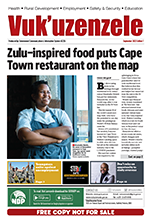
English PDF version
Translations
Afrikaans
isiNdebele
isiXhosa
isiZulu
Sepedi
Sesotho
Setswana
Siswati
Tshivenda
Xitsonga
Accounting ace helps make studying easier
Accounting ace helps make studying easier ReneilweA young man who excelled in business studies in matric refused to let unemployment crush him – instead, he found a way to use his natural skills to give back to society while also earning a living.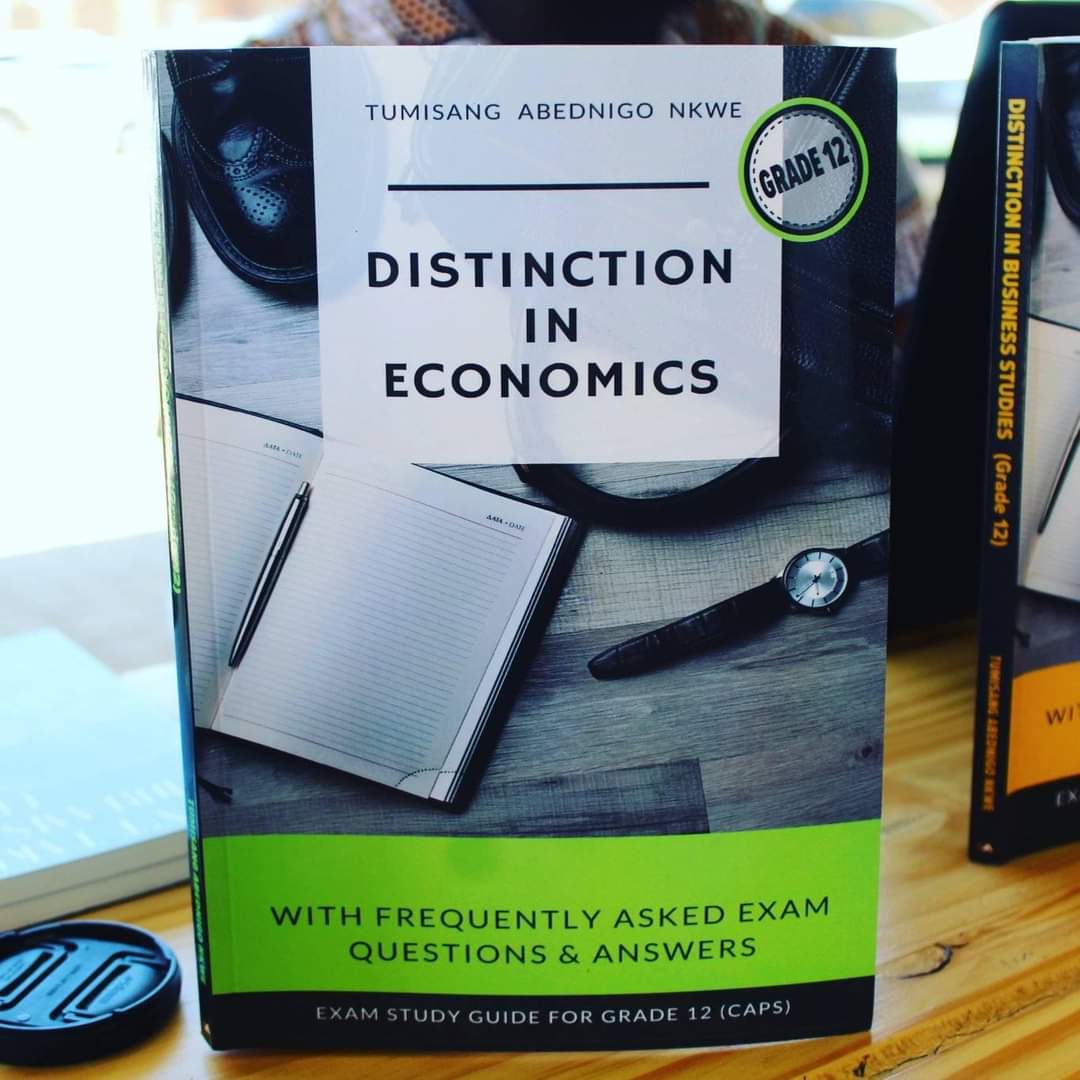
When Tumisang Nkwe (28) from Taung in the North West realised his Department of Social Development internship was ending, he decided to put his talents to use and write accounting, business studies and economics study guides for high school learners. When he could not find a publishing company willing to print his guides, he started his own academic publishing company, called TANE Education, in 2017 – which he funded from his savings.
“The reason I chose these subjects is that I had passed business studies and economics with distinctions in matric and wanted to help other learners to earn distinctions in the same disciplines,” says Nkwe. The guides are easy to understand and affordable, he says.
Nkwe’s study guides cost R200.
TANE education now publishes business studies, economics, accounting and mathematical literacy guides, and plans to add geography, physical science, life sciences, agriculture and mathematics.
To promote his guides, Nkwe built relationships with schools and offered his products. Learners in over 50 schools across the North West, Northern Cape and Gauteng now use his study guides.
Nkwe is working on establishing a digital platform called LearnFlix, which will enable school learners to access TANE learning material online. The young go-getter has also published his own book, Don’t Take Your Dreams to the Cemetery, to remind people to live life to the fullest.
His advice for learners and the matric class of 2022, is: “Education can only take you so far; however, you have the responsibility to create the life that you desire. Matric results do not determine your future – that duty lies with you.”
His study guides are available from selected bookshops or directly from TANE. Send an email to tumisang.abednigo@gmail.com.
Agritourism puts farmers on the map
Agritourism puts farmers on the map ReneilweThe tourism and agriculture sectors are coming together to ensure innovation and job creation.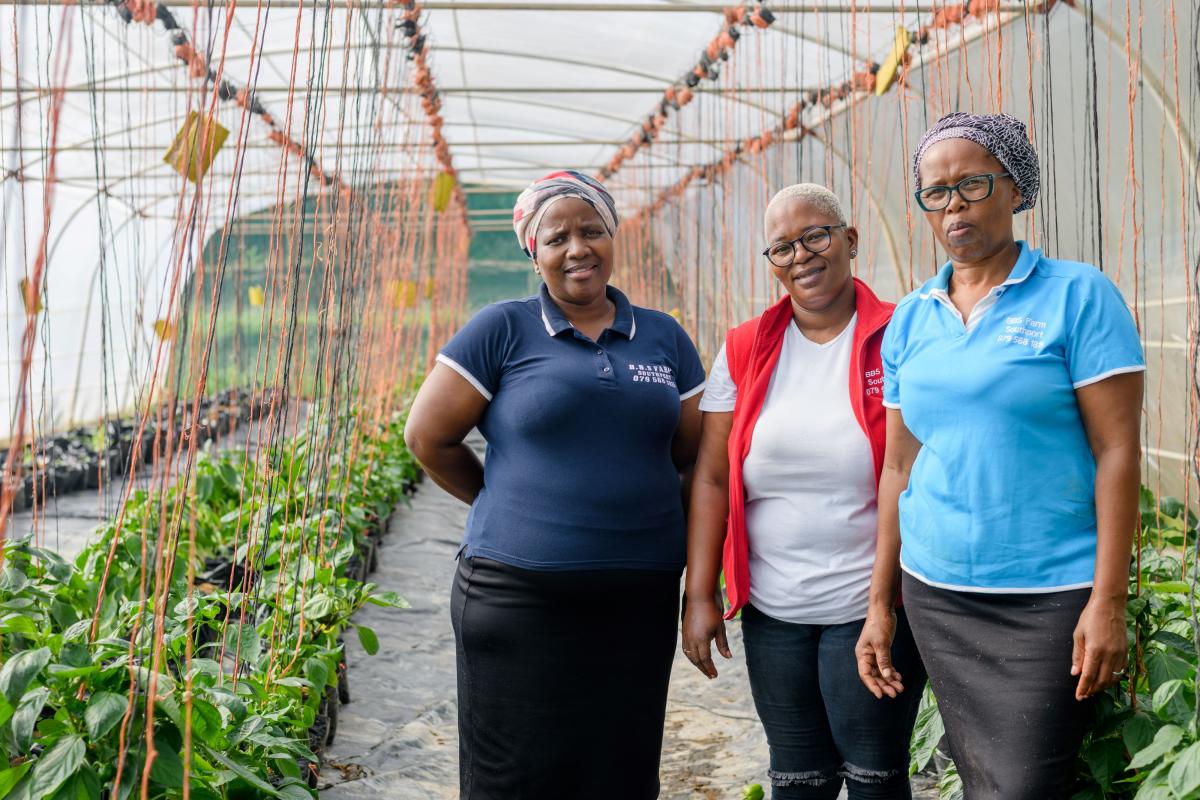
Agritourism is when farmers turn their land into a destination and open their doors to the public to teach them more about what they do.
This practice is becoming increasingly successful, especially in rural KwaZulu-Natal, where South Coast Tourism and Investment Enterprise (SCTIE) has launched agricultural tours to support female farmers and tour operators.
“Agritourism unlocks economic potential in rural areas by providing visitors with a unique, behind-the-scenes experience of farming and creating much-needed jobs,” says SCTIE Chief Executive Officer Phelisa Mangcu.
Ubumbano in Amandawe is one of the benefitting farms. Sisters Nelly and Nolwazi Zama co-founded their agricultural cooperative in 2017 as a mixed farming venture, producing choice-grade crops.
“We have sugar cane, seasonal vegetables, macadamia nuts and bananas. Our offering is different as we also make products from some of our produce, including chilli jam, which is now stocked in Fifi Fish Shop, one of the South Coast’s gems,” says Nolwazi.
Nelly says that while the area is already a tourist attraction, the addition of agritourism is an added drawcard.
Ubumbano Farm now offers tours of the farm, teaches visitors about its techniques and lets them taste its fresh produce.
Located in Southport, BBS Farm – which is named after its three female founders – Busisiwe Lubanya, Silindile Zondi and Bongi Lushaba – is another SCTIE beneficiary.
The farm produces green peppers, bananas, tomatoes and macadamia nuts.
After securing land from the Department of Agriculture, Land Reform and Rural Development and a loan from Ithala Bank, the trio erected farming tunnels and identified uncommon produce to farm. By doing this, they created a niche market.
“The idea was to create more market demand. We started with heritage tomatoes, which come in a variety of red, green, yellow, orange and maroon, and we packaged them differently by mixing in cherry tomatoes. People were very keen on this,” says Lubanya.
BBS Farm now offers tours of its organically grown produce, hydroponic system and macadamias. It also offers fishing at its dam and great food.
For more information about the farm tours, contact Ubumbano at 071 556 2596 and BBS at 079 568 1815. For information about assistance from SCTIE, call 039 682 7944 or email info@sctie.co.za.
Beneficiaries warned against selling government subsidised houses.
Beneficiaries warned against selling government subsidised houses. JoyHuman Settlements Deputy Minister, Pamela Tshwete, has reiterated that title deeds are not a licence to sell government subsidised houses.
“A title deed is proof of ownership of an asset that must be handed over to future generations. We discourage people who sell their houses after receiving their title deeds. This, including the renting out of houses, is a bad habit that we must collectively address as a matter of urgency,” Tshwete said.
Tshwete was speaking during the handover of title deeds to beneficiaries at Obed Mthombeni Nkosi in Lesedi Local Municipality, Gauteng.
The event at Obed Mthombeni Nkosi was part of a community engagement programme in line with the Presidential Imbizo which took place recently in Sedibeng District Municipality in Gauteng.
The imbizo is aimed at assessing service delivery through the implementation of the District Development Model (DDM), to enable integrated and responsive planning, implementation and budgeting across all spheres of government.
The Deputy Minister, together with Gauteng Human Settlements MEC, Lebogang Maile, told the community that receiving title deeds does not mean they should sell their houses.
They warned that the selling and renting of fully subsidised government houses, also known as RDPs, has caused challenges not only for government but also for beneficiaries who often become indigent again.
“A qualifying beneficiary can only benefit from one house from government. Our system is able to detect and prevent double dipping… This results in people finding themselves destitute again and homeless after selling their houses,” Deputy Minister Tshwete said.
Minister Maile said government is committed to responding to all the concerns raised regarding challenges in the allocation of newly built houses.
The Gauteng department of Human Settlement handed over 1200 title deeds to the community of Obed Mthombeni Nkosi.
Book an appointment for your smartID or passport online
Book an appointment for your smartID or passport online JoyA new online appointment booking system, for smart ID cards and passports, is set to reduce the dreaded long queues for these two services at various Home Affairs offices across the country.
The Department of Home Affairs launched its Branch Appointment Booking System (BABS) in May, at selected Home Affairs offices, to enable customers to book an appointment to process smart ID card and passport applications.
“There are no appointments made or received for other Home Affairs services, such as marriage and birth certificates and requests for amendment or rectification of personal information,” says Siya Qoza, the spokesperson for the Minister of Home Affairs.
He explains that the BABS is being phased in at large Home Affairs offices that are already on the Live Capture (online) system, and 56 offices have already been added to the system.
Once you have booked your appointment, the system will automatically send you an SMS or email reminder three days before the appointment date. Should you wish to cancel or change your appointment, you can do so by logging back into the system.
Appointments are not transferable, so you cannot make an appointment and then give the slot to a friend or family member.
How to book
It’s quick and easy to book an appointment on the BABS.
- Step 1: Visit www.dha.gov.za.
- Step 2: Click on BABS.
- Step 3: Enter your South African ID number.
- Step 4: Enter your other personal details in the fields provided.
- Step 5: Select your province, city and branch.
- Step 6: Click on select timeslots.
For a list of all Home Affairs offices that currently offer online bookings for smart IDs and passports, call the Home Affairs Contact Centre at 0800 60 11 90 or visit http://www.dha.gov.za/index.php/notices/1557-branch-appointment-booking….
The following offices offer the online booking system
|
PROVINCE |
OFFICE/BRANCH |
|
Gauteng |
|
|
Western Cape |
|
|
KZN |
|
|
Eastern Cape |
|
|
North West |
|
|
Limpopo |
|
|
Mpumalanga |
|
Choose an in-demand career
Choose an in-demand career tsoanaWith the high unemployment rate amongst the youth in South Africa, school learners are encouraged to familiarise themselves with the list of occupations in high demand (OIHD) that is compiled by the Department of Higher Education and Training (DHET).
‘Occupations in high demand’ refers to those occupations that show relatively high employment growth based on past, present and future trends and that are currently in shortage. This means that young people who qualify in these fields are more likely to find a job. By encouraging young people to train for in-demand jobs, it also means that South Africa will have the people with the skills needed to grow the economy.
Higher Education and Training Minister Dr Blade Nzimande released the latest list in November 2020. The list is put together every two years by the department, which studies the labour market t o see which sectors need more skilled people.
o see which sectors need more skilled people.
This helps universities, colleges and other training institutions better plan their courses, and helps high school learners make good subject and career choices.
Speaking to Vuk’uzenzele, DHET spokesperson Ishmael Mnisi says all organisations, both in the public and private sectors, need to know which skills are needed to grow South Africa's economy and develop the country socially.
Mnisi believes that choosing subjects and possible career paths is challenging for youngsters. The best way to help them, he says, is through better information about career opportunities and what subjects are needed for admission to the various courses.
He says self-employment must also be considered, rather than working for a boss or waiting for a job to become available. “… so entrepreneurship education and support are important,” he says.
There are 345 jobs on the 2020 OIHD list including:
- Director (enterprise/organisation) – the minimum qualification required is a diploma or advanced certificate (NQF Level 6) in a business/finance-related field. Those interested will have to do the following subjects in high school: mathematics, business studies and finance-related subjects.
- School principal – the minimum qualification required is a bachelor’s degree or advanced diploma (NQF Level 7) in education.
- Actuary – the minimum qualification required is a bachelor’s degree or advanced diploma (NQF Level 7) in actuarial science. Subjects such as pure mathematics, physical science and English are important in high school.
- Footwear designer – Diploma or advanced certificate (NQF Level 6) in the design and construction field.
- Electrical engineering technician – the minimum requirement is a diploma or advanced certificate (NQF Level 6) in the electrical engineering field. Subjects to study in high school are mathematics, physical science, English or Afrikaans.
The full list can be accessed on: https://www.gov.za/sites/default/files/gcis_document/202011/43937gon126…
The DHET is set to publish its next list of occupations in high demand in November.
Educational opportunities or skills to acquire without matric
Many young people may think that they cannot further their studies without a matric certificate, but this is untrue. Technical and vocational education and training (TVET) colleges offer multiple courses that allow you to further your studies without a matric certificate.
Some of these courses include national certificate (vocational) courses that are equivalent to a matric certificate in various disciplines. These courses are NQF Level 4 certified, which is the same certification as matric on the NQF level.
Just to mention a few, these courses include a national certificate in small business financial management, bookkeeping, project management studies and business management studies.
Learners interested in these courses who do not have a matric certificate, can visit their nearest TVET college for more information
Cool beans! How a young woman is helping feed SA
Cool beans! How a young woman is helping feed SA ReneilweA young KwaZulu-Natal(KZN) woman is riding the success of her bean farming into the commercial agricultural space.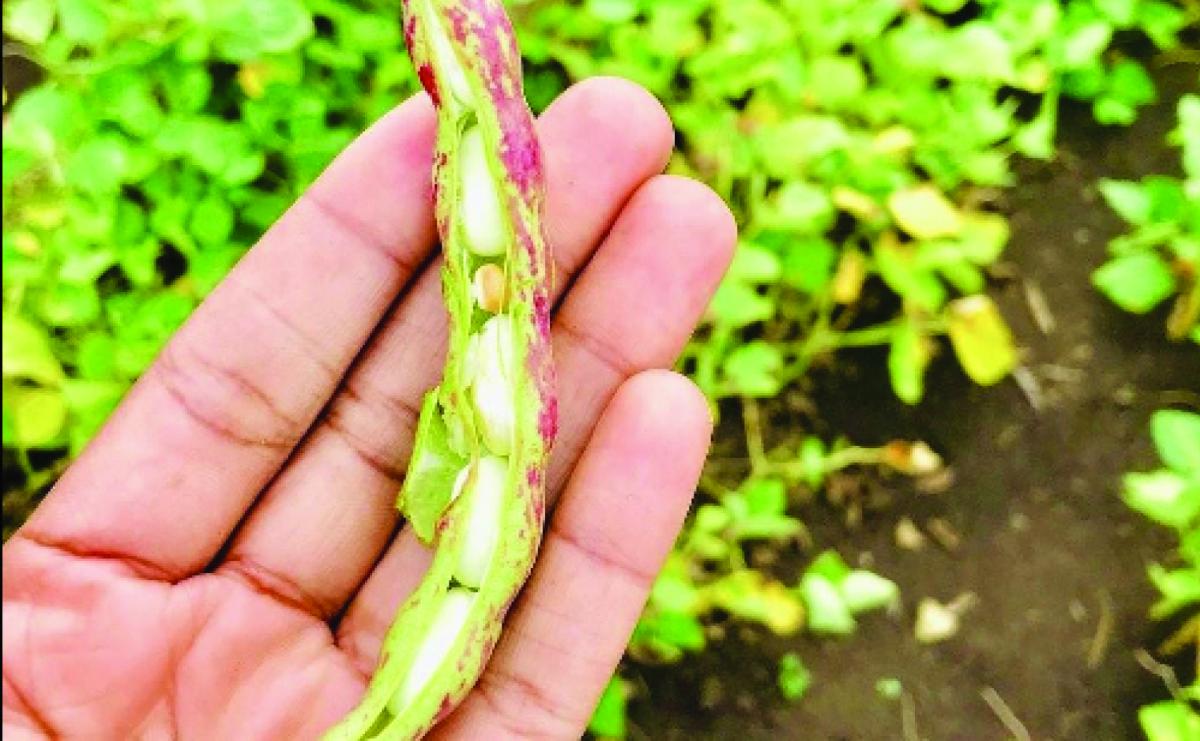
Ayanda Zulu (29) started growing beans – considered a staple food in South Africa – in 2016, on 14 hectares of land in Nongoma, north of KZN, that was made available to her by the local chief. She has been so successful that she has now been able to acquire a 500-hectare farm in Eshowe, just over two hours’ drive away.
After qualifying as a teacher, Zulu battled to find a job. This, she says, was a blessing in disguise because she ended up farming instead. After doing research and visiting farms, she chose to plant beans, which suit the dry climate because they do not need much water.
Zulu says she received funding and technical support from the KwaZulu-Natal Department of Agriculture and Rural Development in 2020, which helped her to harvest more beans to meet market demand. Growing beans was a good choice, she says, because of the little water they require and the fact that South Africans are among the biggest consumers of beans, yet very few people are producing them. Additionally, the market price is increasing. “When I first started in 2016, I was making
R16 000 per ton, but within a few years, the price had doubled to R32 000 per ton,” she explains.
Zulu sells her beans by the ton, packaged into 50kg bags. Helping her with the work are 10 permanent employees, which means her farm has become a source of income for other villagers. In addition, four local TVET college students are doing their internships at the farm.
She says after gaining a good reputation in the industry, she now attracts private investors. With beans being a seasonal crop, Zulu grows cabbage and maize during the rainy season and has also started cattle farming – with a focus on beef production.
“I used to sell the beans to the locals, and they would ask if I also had cabbage. I decided to add it to the farm, especially when it is the off-season for beans. I also love livestock; it will be my biggest project going forward,” she says.
Zulu says her new farm in Eshowe will help her become established as a commercial farmer. Although the climate in Eshowe, which is a short drive from the coast, is different to that of Nongoma, she hopes to successfully grow beans there too.
“I’m still setting up and will do soil analysis. I am hoping that some sections will allow us to continue growing beans. I have acquired so much knowledge about it and I am still learning. We plan to do our packaging [differently] so that we can maximise the profit,”
she adds.
Consider farming as a career
Zulu encourages young people, especially from disadvantaged rural communities, to consider agriculture as a business. “I think all free spaces can be used for agriculture, but we need to find what [crop] is suitable for the areas.”
Aspiring farmers must do as much research as they can – and ask questions of established farmers, before they start. For instance, she says people wanting to grow beans need to know that they must prepare the soil very well to get top-quality beans.
She stresses the importance of farmers finding the right markets to purchase what they grow, before deciding how many seeds to plant. For instance, she says, beans take only three months from sowing to harvesting, so unless you know who will buy your harvest before you plant, you could end up with a harvested crop and no buyers.
Zulu strongly believes that agriculture has huge potential because people always need food.
Farmers who need agricultural guidance and assistance, can contact their local Department of Agriculture and Rural Development. Get in touch with Ayanda Zulu via email: ayandamageba12@gmail.com
Don’t miss the opportunity to study overseas
Don’t miss the opportunity to study overseas tsoanaChevening scholarship beneficiary Menzi Mthembeni Bhengu (33) urges others to apply for a master’s degree scholarship to study in the United Kingdom(UK).
Chevening scholarships are awarded to individuals who have the skills to create positive change in their home country and are committed to doing so.
Those awarded the scholarship are expected to reside in the UK for the duration of their studies.
“This is a once-in-a-lifetime opportunity that can change the future trajectory of your career and will place you in good stead to seize other opportunities abroad or locally,” says Bhengu.
He was selected for the scholarship in 2015 and completed a Master of Science in Social Anthropology at the University of Oxford. “Through discipline and determination, I was able to complete my course in record time.”
Bhengu, who was recently appointed as the manager for transformation and social inclusion at the University of Zululand, says the scholarship also gave him access to an invaluable network of peers and alumni from across the globe.
“It also enabled me to benefit from interinstitutional exposure and a curriculum that has made me relevant to the Southern African market. It aligned me with the next generation of leaders, who are passionate about making a meaningful contribution towards the growth and development of the region,” he says.
The scholarships fall under the UK Government’s global scholarship programme and are funded by its Foreign, Commonwealth and Development Office (FCDO), partner organisations and partner universities.
They offer full financial support to study for any eligible master’s degree at any UK university and offer scholars the opportunity to gain access to a wide range of academic, professional and cultural experiences.
Since the programme started in 1983, over 50 000 professionals have had the opportunity to develop in the UK through Chevening.
“If you are someone who is passionate about driving change in South Africa or globally, if you want to be the best at what you do and if you have the imagination to inspire others, then a Chevening scholarship could be the perfect opportunity for you,” says HE Antony Phillipson, the British High Commissioner to South Africa.
Chevening welcomes applications from anyone, irrespective of age, race, gender, religion or cultural background. “We want to see that you have energy, curiosity, compassion, a clear vision for your future and the ability to achieve your goals,” Phillipson confirms.
There are over 1 500 scholarships on offer globally for the 2023/2024 academic year. Applications close on 1 November 2022.
For detailed information about application criteria, visit chevening.org/scholarships. To apply, visit chevening.org/apply
Explore South Africa’s national parks
Explore South Africa’s national parks tsoanaSouth Africans are encouraged to visit the country’s wonderful national parks this September, which is Tourism Month.
Free entrance is offered at selected parks during National Parks Week, which is an annual event.
This year, it will be celebrated from 11 to 16 September.
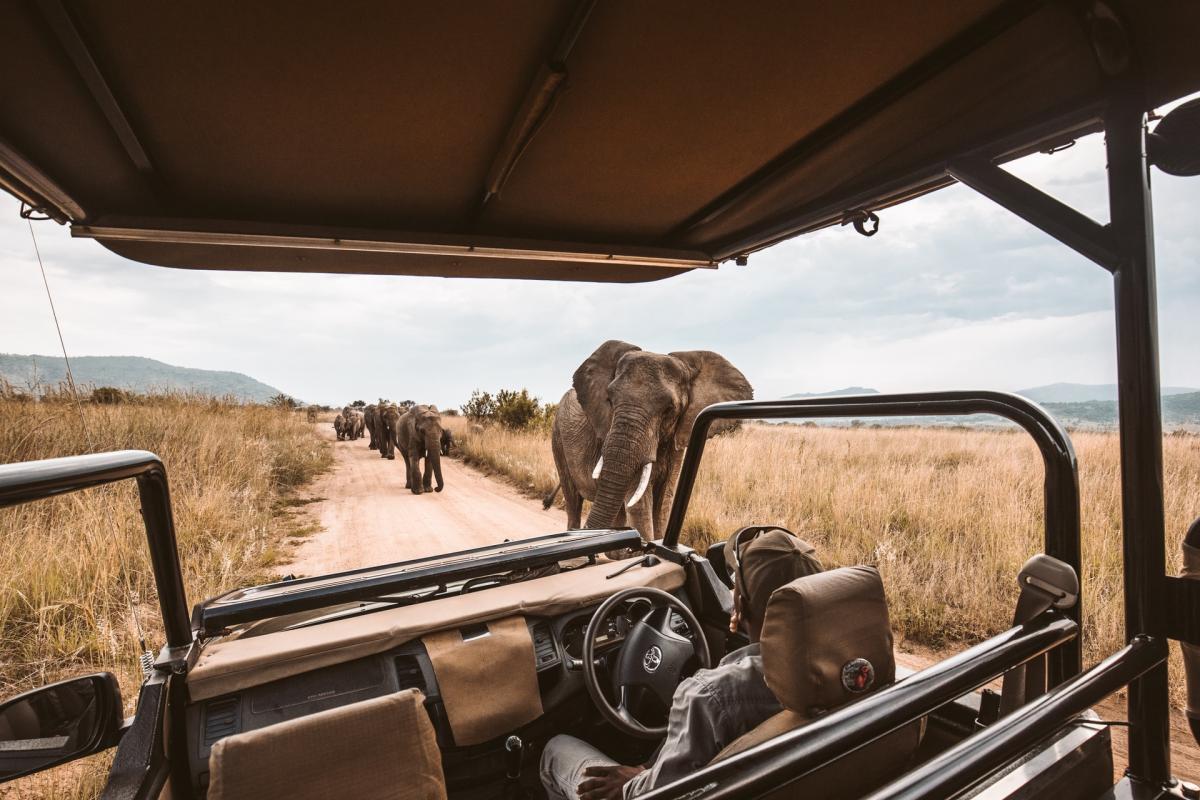
The programme enables people from the communities surrounding national parks who are not able to afford the entrance fee a chance to enjoy these wonderful South African treasures.
During National Parks Week, people will be granted free access to the participating parks as day visitors, where they will get to enjoy the scenery, animals and day visitor facilities, such as picnic sites. Do note, however, that free access to the parks does not include accommodation and other tourist activities.
The initiative has been running since 2006. It aims to encourage people to ‘know your national park’. Over the past 15 years, close to 620 000 people have taken the opportunity to visit the participating parks for free.
“The week was established in a bid to cultivate a sense of pride in South Africa’s natural, cultural and historical heritage, protected by the national parks system,” says SANParks Acting Chief Executive Officer Hapiloe Sello.
SA National Parks Week has been successful in making people aware of conservation issues.
“This initiative aims to give the public an understanding of the role that SANParks plays as custodian of the country’s natural heritage. If we are to create a sense of ownership of the natural heritage of South Africa in all South Africans, then all South Africans must be able to have access to such. We especially want our young people to take advantage of this opportunity because this heritage will be under their protection in the near future,” says Sello.
SANParks stokvels and travel clubs
Register your travel group or stokvel with SANParks and receive discounts at selected parks and camps. The programme offers adjusted payment terms and discounts.
These travel packages are inclusive of accommodation and activities suitable for travel groups.
Download the forms from www.sanparks.org/tourism/stokvels-and-travel-clubs.php and register your travel group via email at traveltrade@sanparks.org or phone 012 426 5025.
Visit www.sanparks.org/tourism/stokvels-and-travel-clubs.php for more information and terms and conditions on travel groups and stokvel packages.
For more information on SANParks, call 012 428 9111 or visit the website www.sanparks.org/
Feeding the community
Feeding the community ReneilweAnna Kgaretswe is contributing to turning the fortunes of her community around.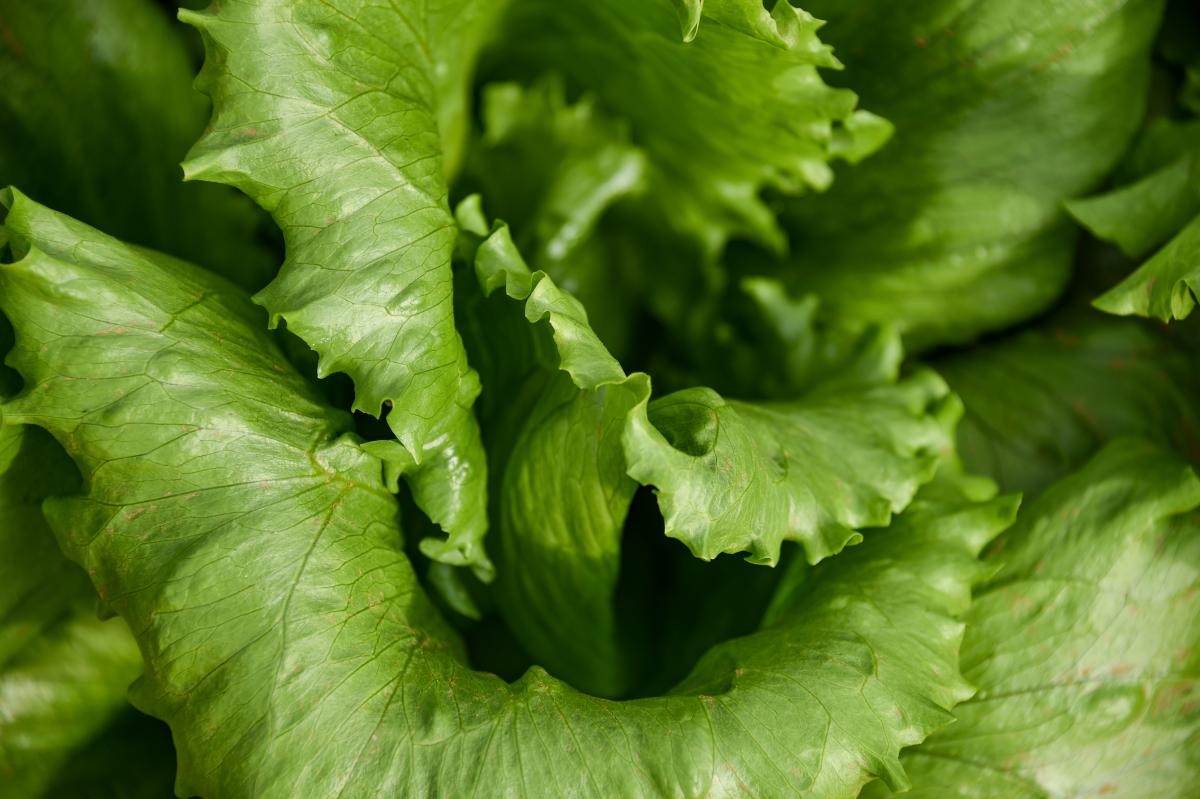
A JoJo tank and vegetable tunnels filled with a variety of vegetables fill Kgaretswe’s yard, which she has converted into a vegetable farm for the benefit of both her family and community.
The 49-year-old is one of the beneficiaries of the Sibanye-Stillwater Marikana Renewal initiative, implemented by SocioTech and Umsizi, which for years have worked together to come up with ideas that help empower communities.
Through her participation in SocioTech’s Broad-Based Livelihoods programme, Kgaretswe has been able to grow her business and transfer skills to others.
Kgaretswe, who lives in Majakaneng in the North West, says someone from Socio-Tech visited her in 2017 and told her how she could grow her then small vegetable patch into something bigger. That visit was the start of better things to come and today Kgaretswe not only has her own business, but enables Majakaneng community members to produce their own fresh produce.
“Through them, I learnt about developing the soil and growing [food] God’s way – organically, without chemicals. I supply street vendors and also supply small catering businesses that sell in the streets,” she says.
The programme gave Kgaretswe seeds, material for a vegetable tunnel and buckets to water the vegetables. She did so well that last year, she walked away with a SocioTech award and used the prize money to build a second tunnel.
Kgaretswe is today able to support her family, while also saving money every month.
Skills transfer
Through the Phinda Phinda project that is part of the programmes offered by SocioTech, Kgaretswe has trained 16 people to start vegetable gardens. These people in turn teach friends, family and neighbours.
“When my business began to grow, people in the community could not believe it and started asking me how I do it. I told them to come to school because Sibanye is here for all of us; we must help each other to put food on the table.”
For more information about the Sibanye-Stillwater Marikana Renewal initiative visit www.marikanarenewal.co.za
First black-owned adoption agency gives children a new start
First black-owned adoption agency gives children a new start ReneilweA Free State welfare organization is teaching communities about the importance of a legally adopting the children they are raising as their own.
A South African child adoption agency is addressing the stigma of legal adoption among African communities.
Setshabelo Family and Child Welfare Services, based in Botshabelo in the Free State, became the country’s first black-owned child adoption agency in 2020 when it received its accreditation from the Department of Social Development.
Keabetsoe Sekoboto, Setshabelo Executive Director, says the organisation’s mission is to ensure that legal adoption is accessible to families that cannot have biological children and those who choose to adopt.
Formed in 2014, Setshabelo initially provided only child protection services, but added adoption services because it saw a need in the community. Although black people have informally raised children that are not their own throughout the ages, legal adoption is often viewed with distrust.
Setshabelo is helping to change this.
“We make it [adoption]
very African, because context is important in social services. Services will not be accessible to our people if we do not have the context [of a case].”
In black communities, having a child is a ‘family and community business’.
“We believe that it’s the village that eventually ends up raising a child, and it’s a community that supports a parent. If the community is not on board with what adoption is, without an understanding, they will not be able to embrace children that legally come through adoption,” she says.
She says Setshabelo wants people to embrace the legal adoption process. People should not feel the need to hide the fact that they adopted a child because they are scared of the community’s reaction, she says.
Long journey
The organisation’s accreditation as an adoption agency is valid for five years – but receiving the go-ahead to help with legal adoptions started in 2016 and took four long years to achieve.
“We could not be accredited immediately because we did not have a track record as an organisation. So after we got designated as a child protection services organisation, we partnered with Engo… they have been doing adoptions for over 50 years now.”
Between 2016 and 2020, while working with Engo – a non-profit and non-government organisation (NGO) – Setshabelo concluded 168 adoptions. Working independently in the 2021/22 financial year, the organisation concluded 89 adoptions.
As an NGO, Setshabelo has received a total of R507 000 in grants from the Department of Social Development’s victim empowerment programme in the 2021/2022 and 2022/2023 financial years.
The funding has helped the organisation give support to 209 families. It has also been able to create jobs for social workers, who have been placed at the two police stations in Botshabelo to offer services to survivors of gender-based violence (GBV); two auxiliary social workers and a mental health counsellor.
GBV survivors are helped through the process of reporting their abuse and, if necessary, going to the hospital for treatment. They get to talk about their trauma and are helped to get a protection order.
Adoption agencies
Sekoboto says people used to believe that legal adoption was not really necessary in the African context. Her organisation helps people understand that by going through the adoption process, the law sees the child as a legal member of their family.
If an adoption is not formally done through the courts, there may be confusion when the person who brought the child into the family dies.
She says Setshabelo’s approach is to reiterate that black communities have always done adoptions, albeit informally. “It is just the legality of it that we are adding,” she says.
Children want to belong; they want permanency, she says. “They don’t want to just be ‘one of’ – they want to be ‘part of’. Adoption takes away that
barrier.”
For more information about the Department of Social Development contact www.dsd.gov.za
For more information about Setshabelo Family and Child Welfare Services, call 051 531 9001 or visit www.sasfcs.org.za.
NYDA funding allows Shange to call the shots
NYDA funding allows Shange to call the shots tsoana After failing to make it as an actor, Mthokozisi Shange changed direction and moved from in front of the camera to behind it.
After failing to make it as an actor, Mthokozisi Shange changed direction and moved from in front of the camera to behind it.
He is one of many young South Africans benefitting from the technological age, which has seen multi-media businesses being started to meet the growing demand for social media videos and short documentary films.
Shange (31) of Kagiso in Gauteng used to get work as an extra (actors who play minor roles in the background) on several popular TV drama series.
The self-taught photographer and videographer says that while he was passionate about acting, he has found his place behind the camera after struggling to secure acting roles.
He established his film and photography company, Preparing Future Film, in 2016 after working as an extra cast member for drama series Isibaya.
Through hard work and determination, Shange recently received R60 000 in funding from the National Youth Development Agency (NYDA), which enabled him to buy a camera and drone.
The NYDA Grant Programme assists young businesspeople who are determined, show promise and are in the early stages of their careers. These entrepreneurs are mentored and receive business consultancy services, market linkages and business management training programmes, among others.
Shange, who hails from rural Msinga in KwaZulu-Natal’s midlands, says his business specialises in filming private and corporate events, short films and promotional videos for social media.
“When I first set foot on a television set, I realised that there were many opportunities other than acting.
“Multi-media production has many elements, especially on television. These elements are all provided by different people, and they make money out of them. Sadly, very few are aware of such opportunities,” he says.
Young entrepreneurs who want to apply for non-financial and financial support from NYDA can call 0800 52 52 52, visit their local NYDA branch or download an application form from www.nyda.gov.za
Orange Farm pair find treasure in trash
Orange Farm pair find treasure in trash ReneilwePhumudzo Muthanyi (29) and Mbali Mokgosi (31) from Orange Farm, south of Johannesburg, successfully turn junk into high-end fashion.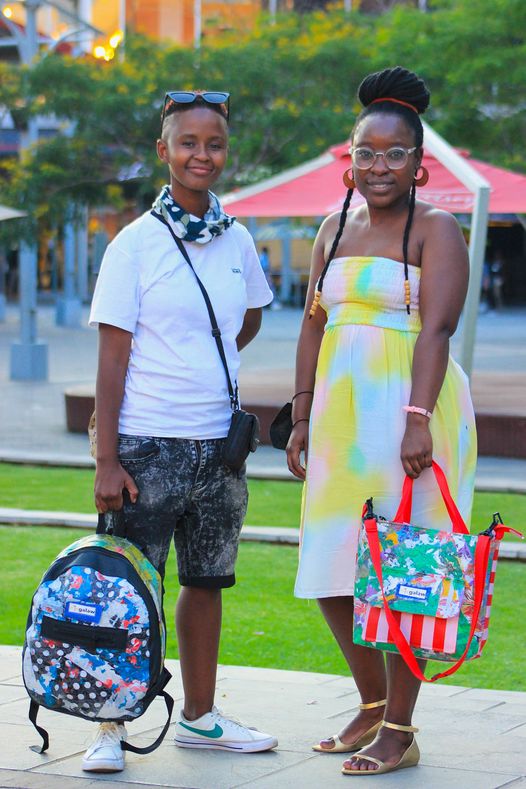
The duo’s company, MicGalaw, uses discarded plastic from rubbish dumps and landfills to create bags, accessories, home crafts and furniture.
Recycling is the process of collecting trash and turning it into new products.
Muthanyi says they were inspired to recycle plastic after seeing how many discarded bottles and other pieces of plastic were strewn across their township – turning what could be a pretty space into a polluted one.
“It took us about three years to learn the art of working with plastic. Our big break came when we won a pitching competition prize of R12 500 in 2018 during Global Entrepreneurship Week. We were able to purchase our first heavy-duty industrial sewing machine, equipment and materials.”
In 2019, the women produced their first collection, consisting of five stylish bags made from recycled plastic.
Since then, they have made a name for themselves, with the MicGalaw brand becoming known for its eye-catching designs. All their products are made from recycled materials and are affordable – with most ranging from R50 to R350 an item.
The waste collected by MicGalaw is washed and separated. The recycled plastic is then shredded and melted to become a leather-like fabric. This is followed by cutting the material according to a pattern and the final product is created.
MicGalaw says it managed to recycle over 50 000 tons of plastic between 2019 and 2020 that were smothering Johannesburg, Mogale City and the surrounding areas.
MicGalaw has also created income opportunities for young people through its Clean Up and Popa initiative, in which participating youngsters collect plastic for a set fee.
The company has made gifts for many corporates – including laptop backpacks – and hopes to secure more of these orders. “We would like to grow our business from a micro-business to a small developing business and create employment for more young designers from Orange Farm and Mogale City,” says Muthanyi.
For more information on MicGalaw, call 078 220 5840 or go to Facebook: @MicGalaw
Refurbished training centre is good news for future artisans
Refurbished training centre is good news for future artisans ReneilweThe Steel and Engineering Industries Federation of Southern Africa (SEIFSA) has invested an estimated R12 million in refurbishing a training centre in Benoni, Ekurhuleni.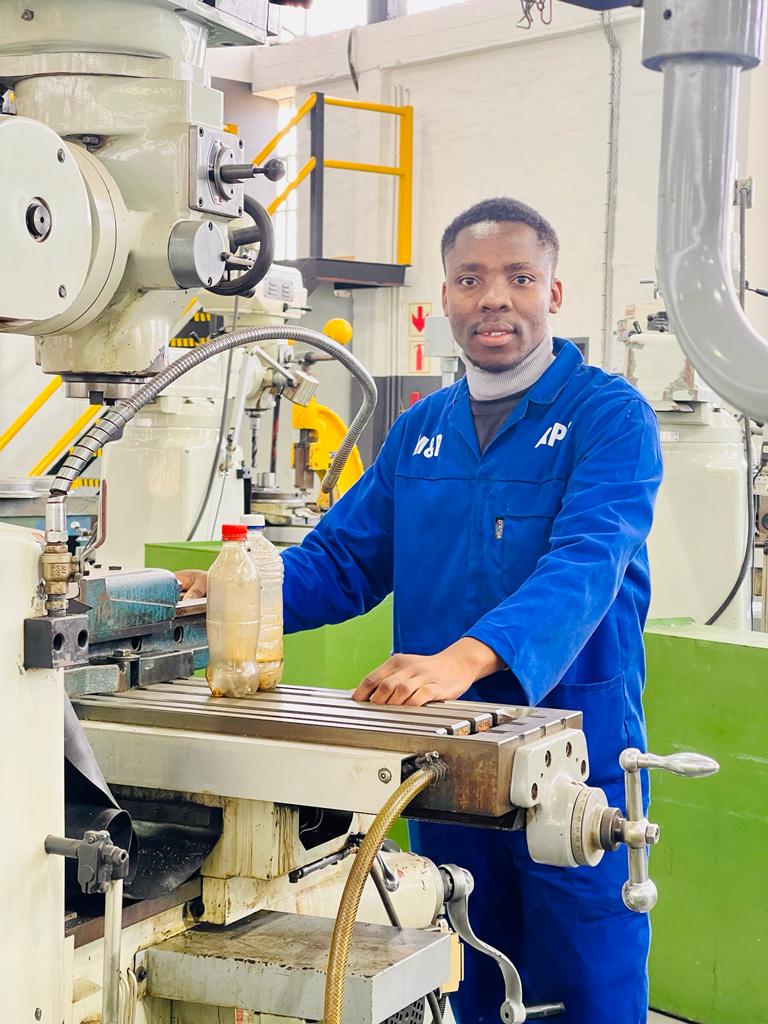
SEIFSA is a national federation representing 18 independent employer associations in the metal and engineering industries. The training centre, originally opened in 2014 and offers post-matric apprentice training, leadership, short technical courses, continuous upskilling of artisans and trade competency assessment services, among other things.
It is registered with the Department of Higher Education and Training (DHET) and the National Artisan Moderation Body as a trade test centre and has tested more than 400 candidates per year, since 2014. The refurbishment means that instead of focusing mainly on apprenticeships, the centre is now able to prepare youngsters for the Fourth Industrial Revolution (4IR).
Speaking at the opening, the Deputy Director-General of the Skills Development Branch at the DHET, Zukile Mvalo, said South Africa desperately needs to use, absorb and develop local people in the steel and engineering sectors to achieve economic progress. This will help the country ‘tackle the challenges of unemployment, inequality, poverty and now hunger’.
New opportunities
Puleng Mahlong (25) from Ramahantsha Village in Limpopo studied at the centre and says it was an eye-opener for him. He says he studied maths and physics at school, but was unable to get into a university and so chose to do a technical qualification in the mechanical trade. He says the educators had extensive knowledge and he benefited from the hands-on training.
Mahlong says that as a result of the thorough training, he is now employed at APE Pumps in Germiston.
SEIFSA Training Centre Director Preggy Chetty says their courses are meant as a stepping stone to finding work. “We can train people, but if they cannot get jobs, then we need to do more. Our innovation hub and business incubation facilities will take newly qualified welders and boilermakers, for example, through the process of setting up their small businesses, with the support of the SEIFSA Training Centre.”
Entry-level programmes require a Grade 10 with pure mathematics or physical science or an N2. Candidates may also have to write an entrance test. The centre also helps people get a formal qualification through the recognition of prior learning process. The recognition of prior learning process is assessed on individual cases.
Contact the centre at 011 422 2500, email info.stc@seifsa.co.za or visit www.training.seifsa.co.za
Save money: Buy zero-rated goods
Save money: Buy zero-rated goods JoyWhile the increasing cost of living in South Africa is taking its toll on citizens, especially those from low-income households, you can ensure that your money goes further when shopping for groceries by buying zero-rated goods.
Zero-rated goods are certain basic foods that people do not have to pay tax on, which means they are sold at a cheaper price. People who buy food off the zero-rated list can get a little more for their money, which helps them to put nutritious food on the table.
 According to Statistics South Africa (Stats SA), food and non-alcoholic beverages (NAB) cost 8.6% more in June this year than they did in June 2021.
According to Statistics South Africa (Stats SA), food and non-alcoholic beverages (NAB) cost 8.6% more in June this year than they did in June 2021.
Stats SA said the food products that have increased the most are bread and cereals (which includes maize meal), meat and oils and fats – all of which are staple foods in many households.
Bread and cereal products have increased by 11.2% since June 2021, up from 8.4% in May this year, when the Consumer Price Index (CPI) increased by 1.1%. The monthly increase was 2.6%, with notable price rises for maize meal (5.2%), brown bread (3.2%) and macaroni (3%). In addition, meat prices increased by 9.5% from June 2021 to June 2022., and cost slightly more than they did in May 2022.
Oils and fats increased annually by 32.5%, compared with 26.9% in May when the CPI increased. The high cost of sunflower oil, in particular, is putting extra strain on budgets.
Save with zero-rated goods
Zero-rated goods were introduced by government in 1991 to help low-income households. Since the initial introduction, more items have been added to the list.
According to the South African Revenue Service, zero-rated foods are taxed at a rate of 0% – this means people pay 15% less for these goods because they do not have to pay VAT.
These items include:
- Brown bread
- Dried mealies and mealie rice
- Brown bread flour (excluding wheaten bran)
- Samp
- Eggs
- Fresh vegetables and fruit
- Dried beans
- Lentils
- Maize meal
- Rice
- Pilchards in tins or cans
- Vegetable cooking oil (excluding olive oil)
- Milk, cultured milk, milk powder and dairy powder blend
- Edible legumes and pulses, such as peas, beans, peanuts, etc
Sanitary towels (pads) are also zero-rated, as are maternity pads and panty liners.
Senior citizens must also ask their local shops if they give pensioners a discount, on certain days, on goods that are not zero-rated.
Sedibeng residents have their say at Presidential Imbizo
Sedibeng residents have their say at Presidential Imbizo JoyPresidential Imbizo
Residents of the Sedibeng District Municipality have highlighted housing, sewerage, poor service delivery and unemployment as some of the key areas that government should urgently address to improve their lives.
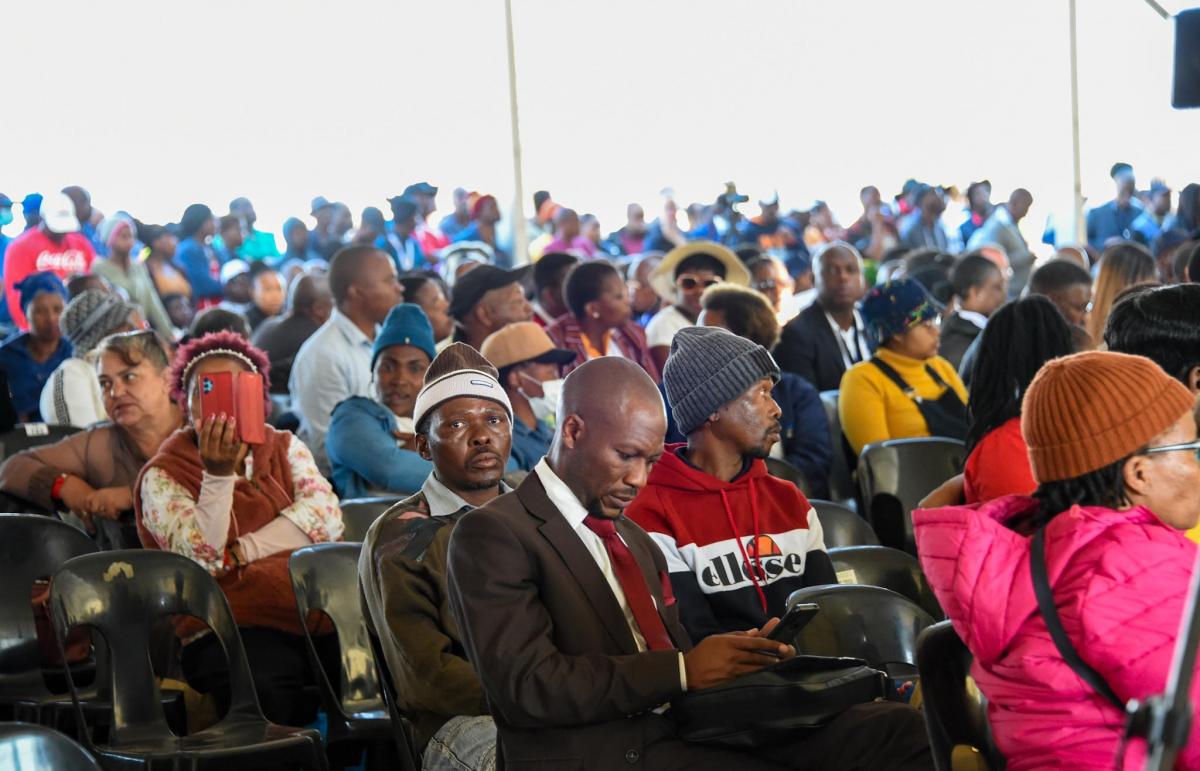 The residents were expressing their views at the District Development Model Presidential Imbizo led by President Ramaphosa at the Sharpeville Cricket Grounds in Gauteng recently.
The residents were expressing their views at the District Development Model Presidential Imbizo led by President Ramaphosa at the Sharpeville Cricket Grounds in Gauteng recently.
Responding to questions and challenges raised by the residents, President Ramaphosa said although the district and the country as a whole faces challenges, government is determined to resolve these.
“As a country we have many challenges but…much as we all have challenges, these challenges are being addressed….one by one. The one challenge that really stood out…was the sewerage that was just flowing into the Vaal river. I’m glad to hear that…this challenge of sewerage, of sanitation is being addressed on an ongoing basis and Minister [of Water and Sanitation Senzo Mchunu]…is addressing this,” he said.
Turning to the high unemployment rate in the district – which stands at some 64% - the President told the gathering that the Vaal Special Economic Zone is pivotal to the revitalisation of industry and consequently more employment of people in Sedibeng.
“By far unemployment is the biggest challenge. The Gauteng government has ambitious plans to revitalise Sedibeng by developing agriculture, by developing logistics, tourism and industries as well. These plans are pivoted around the Vaal SEZ which we have heard has the potential of creating up to 170 000 jobs over the next few years.
“That is a serious number of jobs that will be created right here in Sedibeng,” he said. The President was firm with his assessment of service delivery not only in the Sedibeng District but in local municipalities throughout the country.
“Our municipalities must pay attention to what needs to be done so that our people live with dignity. We want to see an improvement in the lives of our people from a service delivery point of view from now on. We cannot, in this place which used to be the industrial hub of the country, allow our people to live in squalor; in a dirty place,” President Ramaphosa said.
Start saving with a top-up bond
Start saving with a top-up bond tsoanaWith South Africa’s high cost of living making it difficult for people to get through the month, let alone save money, the government has launched a top-up bond to help low-income citizens invest the money they have and save over a long term.
National Treasury launched the RSA Retail Savings Top-up Bond on 1 April 2022 to enable low-income citizens to access investment opportunities that they couldn’t afford in the past.
While a big lump sum of money is usually required when opening an investment, this is not the case with the new top-up bond. Anyone with R500 can invest, start saving money and grow their bala nce with the interest (currently 9.25%) they will receive.
nce with the interest (currently 9.25%) they will receive.
While most other investments do not allow people to add funds to their current investment, the RSA Retail Savings Top-up Bond does. As long as the amount is R100 or more, you can add to your investment at any time over the three-year investment period.
To help build and maintain a culture of saving in South Africa, National Treasury launched
RSA Retail Savings Bonds in 2004. While they soon became a popular way for people to save money over the long term, they did not appeal to youth or low-income households who didn’t have a lump sum to invest.
This challenge became even harder as a result of COVID-19, as people had even less to invest. As a result, those who tried to save did so via stokvels, fixed deposit savings accounts and good old-fashioned penny-pinching.
With many people part of stokvels, government decided to allow informal groups, such as stokvels, to place their pooled savings into a top-up bond, and thus earn interest on their money.
The top-up bond is also more flexible, as investors can switch their top-up bond to a fixed rate or inflation-linked bond if they want to.
Since the launch in April 2022, 932 people have invested in the government’s new top-up bond. Together, the value of their investments is
R24.1 million.
Information supplied by RSA Retail Savings Bonds
For more information or to invest, call 012 315 5888 or visit RSA Retail Saving Bonds’ website at https://secure.rsaretailbonds.gov.za. Informal groups can download the relevant forms from the website. Alternatively, send your questions to queries@rsaretailbonds.gov.za.
Support the police to make South Africa safe Africa safer
Support the police to make South Africa safe Africa safer JoyThere is growing public frustration and anger at the levels of crime in our country.
The recent robbery and gang rape of eight young women in Krugersdorp caused nationwide outrage and led to calls for decisive action against armed illegal mining gangs operating in the area.
 The South African Police Service is to be commended for its decisive actions over the past three weeks in response to the gang rape and criminality in the area. However, communities have rightly pointed out that it should not take a high profile crime for action to finally be taken against criminality.
The South African Police Service is to be commended for its decisive actions over the past three weeks in response to the gang rape and criminality in the area. However, communities have rightly pointed out that it should not take a high profile crime for action to finally be taken against criminality.
The reality is that there are serious challenges facing policing in South Africa. But we are working hard to overcome them.
Like all government departments, the South African Police Service is feeling the effects of the country’s fiscal crisis, several years of understaffing and state capture. Police members also work in a dangerous environment where they often have to face violence, injury or death.
Crime in South Africa cannot be eradicated without a strong, capable, professional police force. The capacity of the SAPS was one of the issues flagged in the report of the Expert Panel into the July 2021 Unrest, which we are taking steps to address.
Having restored much-needed stability to the leadership of the SAPS, our focus now is on closing capacity gaps that led to our law enforcement authorities being found unprepared to deal with the events of last July.
Understaffing and lack of adequate training has had a particularly dire impact on community and Public Order Policing.
Government has allocated funding for the recruitment of 12,000 new police trainees, and the first cohort is undergoing basic training. The SAPS Public Order Policing Units will receive an additional 4,000 members this financial year, and arrangements are being made for appropriate training for members.
Drawing on the lessons of last July’s unrest, we are working to improve cooperation between law enforcement agencies and the private security industry in the fight against crime.
We need close coordination with all stakeholders, including business, so that resources and crime intelligence are shared to both improve public safety and deal with crimes that disrupt economic activity.
An example is the collaboration between Transnet Freight Rail and the SAPS to combat infrastructure theft and line sabotage. These crimes seriously affect the economy as companies cannot move their products to the ports for export. Another example of cooperation is between mine security, private security and the SAPS to fight precious metals theft.
As a result of these joint efforts, we are seeing progress in areas like Mpumalanga and Limpopo that have been flashpoints of instability as stolen metals were moved to illicit markets abroad.
Through its national intervention units, the SAPS has also been making progress in combating organised crime, including drug syndicates, gangs and illegal mining.
The SAPS is establishing a task team to tackle illegal mining, alongside other task teams dealing with construction site extortion, copper and cable theft, and theft and vandalism of economic infrastructure.
Besides the successes of effective policing in tackling economic crimes, the hard work of the SAPS in dealing with broader crime often goes unacknowledged.
In the last financial year, for example, SAPS Crime Investigations secured 206 life sentences against 209 accused, of which 154 were for murder and rape. The SAPS Family Violence, Child Protection and Sexual Offences Units secured 356 life sentences against 266 accused. Suspect tracing operations resulted in over 13,000 arrests.
Given the high levels of crime in our society, there is clearly much more that must be done. But these figures do show that many criminals are being arrested and successfully prosecuted. They are not being allowed to get away with murder.
The Directorate for Priority Crime Investigation, known as the Hawks, achieved all of its targets for the last financial year, resulting in arrests and convictions, asset seizures, restraint and confiscation orders and forfeiture orders to the value of millions of rands. The arrests and convictions secured by the Hawks included for illegal mining, damage to fuel pipelines, cash in transit heists and for police murders.
The Hawks have started work with the NPA Investigating Directorate on cases emanating from the state capture commission.
The SAPS has been supporting the fight against gender-based violence, establishing more victim-friendly rooms at police stations and procuring nearly half a million evidence collection kits to be distributed to stations.
Policing cannot be successful without the cooperation of communities. For this reason, we are focusing on expanding the network of Community Policing Forums to improve both policing and community relations.
We commend the communities that are taking responsibility for keeping their areas safe through street patrols, crime awareness campaigns and other activities.
Using the report of the Expert Panel as a basis for organisational reform, we are re-organising and reprioritising resources, improving capacity and strengthening law enforcement capacity across the board.
Being a policeman or policewoman must be one of the most difficult, pressured and dangerous jobs in our country, and often a thankless task. While public frustration with crime is understandable, it is unfortunate that this should give rise to hostility towards our police, who continue to serve and protect.
As government works to provide the police with the necessary resources, training and budgets to perform their work, I call on all South Africans to join the effort to keep our streets and communities free of crime.
Let us acknowledge the hard work of our police and give them our full support in making South Africa a safer place.
Tiger Brands helps emerging farmers
Tiger Brands helps emerging farmers tsoanaEmerging maize farmers from Ventersdorp in the North West have become part of Tiger Brands’ multi-million farmer development initiative to help transform agriculture.
The Dipuno Enterprise and Supplier Development Fund was launched by the food manufacturer to assist emerging farmers with funding and technical support so that they can produce on a larger scale. The first group of farmers involved in the initiative harvested tons of white maize, which will be supplied to Tiger Brands.
Beneficiaries receive technical support and many of the resources they need to become successful commercial farmers.
The company says it has invested over R50 million in the programme and has so far helped 157 emerging black farmers across the country.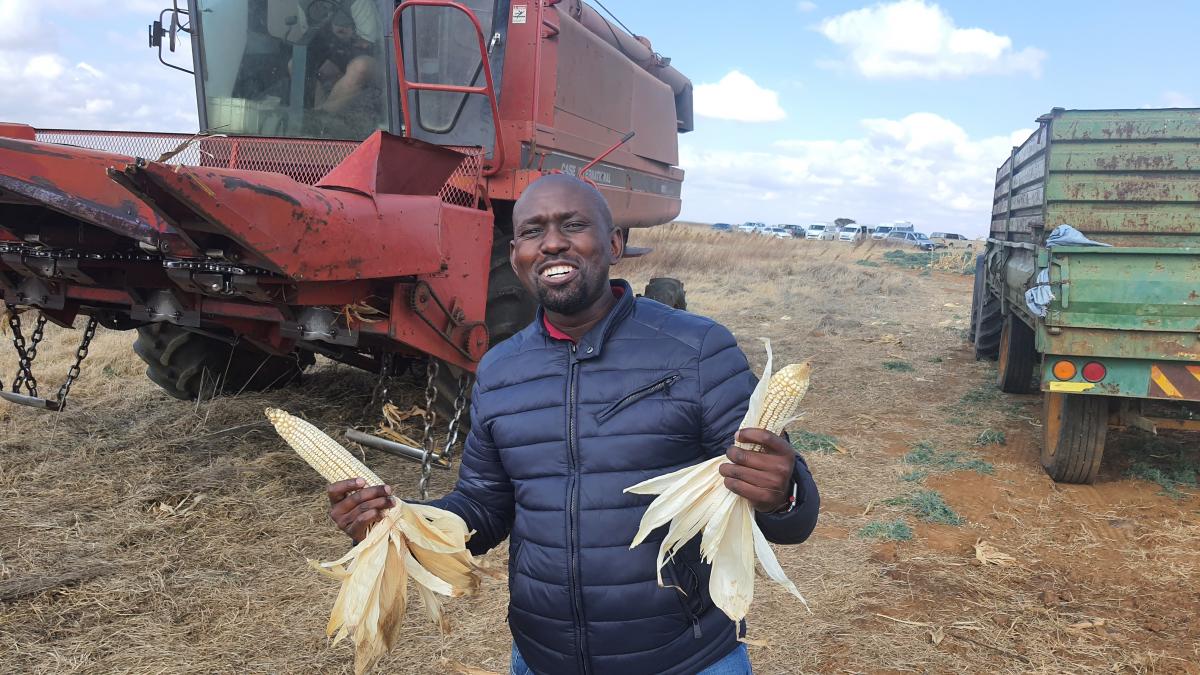
Farmer Kagiso Molebaloa says after receiving funding and other support, he was able to grow 300 hectares of maize – the biggest quantity since he started farming alongside his parents over two decades ago.
The land he leases from the local tribal authority had been left unused for many years because they could not afford to cultivate it.
“The programme allows us to grow at a faster rate than we would have on our own. They offer funding with far less interest, compared to the commercial banks,” he says.
Another beneficiary, Lerako Naphtaly, says he had been farming on only 10 hectares of land, which meant that he could not supply the quantities needed by supermarkets and agro-processors. “Being part of the programme allowed us to have access to a very good market, which is often difficult to find. It also allowed us to be exposed to other potential buyers of our products and services,” he says.
Richard Keothaile, the Chief Director of Land Reform and Rural Development in the North West, says he is pleased that Tiger Brands has answered government’s call to major agriculture roleplayers to play their part in transforming the industry.
Tiger Brands Enterprise and Supplier Development Director Litha Kutta says they plan to help over 1 000 farmers by 2030.
Farmers who want to become part of the Dipuno Enterprise and Supplier Development Fund, visit www.dipunofund.co.za.
Today a reader, tomorrow a leader
Today a reader, tomorrow a leader tsoanaDespite busy days – first as a university student and then as a businesswoman and author – Mbali Blaai (29) has always made time to read.
In fact, she attributes much of her success to falling in love with books in early primary school. The founder of Data Service Agency, co-founder of the Carletonville Book Club, author of The Invitation of a Reading Activist, and Sunday World Unsung Hero 2022 now makes time to inspire other people to read.
“Reading is upgrading and refuelling your mind. You can agree with me that no car can continue to move without fuel. I liken your mind to a car that regularly needs to be refuelled,” says Blaai, who is from Carletonville in Gauteng.
To grow a love of words – and ultimately reading – Blaai started spelling bees in her neighbourhood in partnerships with schools, the Department of Basic Education and her local municipality.
A spelling bee is a competition in which participants spell out words aloud. The participants are eliminated one by one when a word is spelt incorrectly, until there are only two participants left. The first speller to make a mistake comes second.
Spelling bees teach children confidence because they have to compete in front of people. They also improve their vocabulary, which allows them to excel at reading and writing.
“Not all kids have the privilege of growing up in a home in which they are surrounded by books or where reading is the norm,” she says.
Blaai is part of the ReLeaders Facebook group, which aims to get more people reading. Its flagship programme challenges participants to read for 14 days.
“We have seen that after the challenge, people are motivated to continue reading for leisure,” says Blaai.
With Heritage Month celebrated in September, Blaai says books about South Africa’s heritage and culture offer the perfect opportunity to increase awareness about South Africa’s diversity of traditions.
If you would like to join the ReLeaders book club, search for it on Facebook and click on the ‘join group’ icon.
Unemployed graduates to help Home Affairs in digitisation drive
Unemployed graduates to help Home Affairs in digitisation drive JoyHome Affairs Minister, Dr Aaron Motsoaledi recently announced that his department is set to recruit 10 000 unemployed young graduates for the digitisation of its civic paper records.
The digitisation of civic services records was announced by President Cyril Ramaphosa during the State of the Nation Address (SONA) on 10 February 2022.
 Addressing media in Pretoria, Minister Motsoaledi said the department has more than 350 million civic paper records relating to birth, marriages, deaths and amendments.
Addressing media in Pretoria, Minister Motsoaledi said the department has more than 350 million civic paper records relating to birth, marriages, deaths and amendments.
“The category of records dates back to 1895, which necessitates care, and reliable systems that will bear tolerance for digitisation purposes. These records are in all provinces and the bulk of them are in Gauteng, North West and the Western Cape.”
Minister Motsoaledi said his department is increasingly using technology to improve the way it renders services to the people and to improve the security of documents.
The unemployed youth that the department will be recruiting are expected to be qualified in Information Technology or Document, Information and Records Management, obtained from institutions of higher learning (universities, universities of technologies and technical vocational education and training colleges).
Successful youth will be paid a stipend ranging from R5 000 for entry level positions to R9 500 for technical support level positions, and R14 250 for manager level positions.
This cohort will be required to sign a three-year contract linked to the duration of the project.
Minister Motsoaledi said the project will run over a three-year period, effective from November 2022 until October 2025.
The hiring of the young unemployed graduates will be done in collaboration with the Department of Employment and Labour.
The recruitment will be carried out in phases.
Phase 1 will see recruitment of the first intake of 2 000 unemployed youth graduates.
The adverts for this phase will be available in August 2022 and the closing date for application will be the 15th of September. This cohort will assume duty on 1 November 2022.
Phase 2 will see a further recruitment of 4 000 unemployed young graduates. The adverts for this phase will be placed during October 2022. This cohort will assume duty in January 2023.
Phase 3 will see a further and last recruitment of 4 000 unemployed youth graduates. The adverts for this phase will be placed during December 2022 and January 2023. This cohort will assume duty in April 2023.
Interested parties can register and apply online through the Home Affairs and Department of Employment and Labour websites.
For more information about the unemployed graduates programme, visit https www.labour.gov.za or www.dha.gov.za
Unite against corruption
Unite against corruption tsoanaUNITED AGAINST CORRUPTION SPEAK OUT NOW!
Report corruption in government, municipalities and state-owned entities to the SIU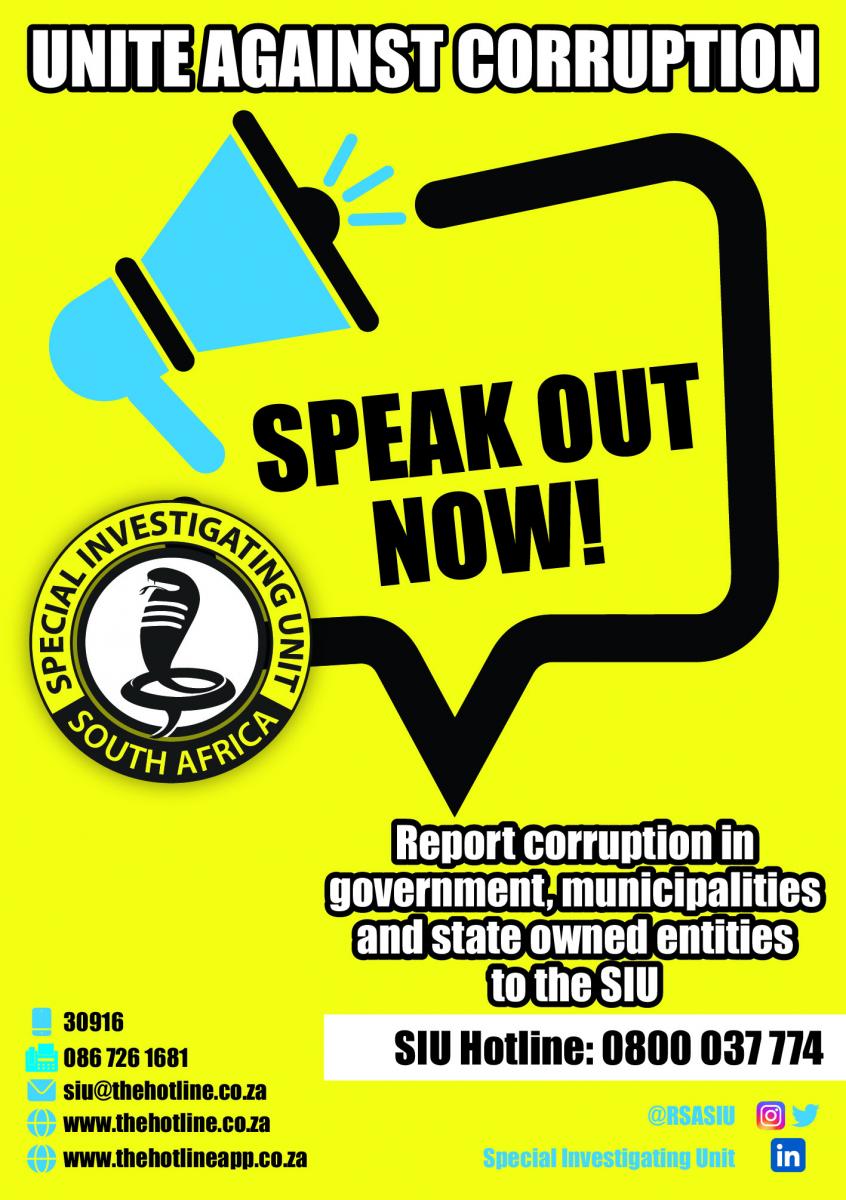
SIU Hotline: 0800 037 774
SMS: 30916
Tel. 086 726 1681
E-mail: siu@thehotline.co.za
Web: www.thehotline.co.za
Instagram & Twitter: @RSASIU
Linkedin: Special Investigating Unit
Youngsters unite against unemployment
Youngsters unite against unemployment ReneilwePerseverance, patience and determination are key attributes for any aspiring farmer.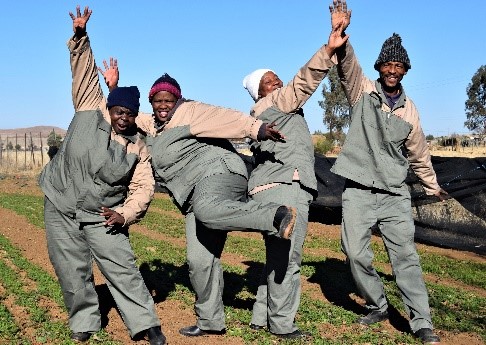
This is according to Mammie Mamkeli who helps run the Ikemisetseng Agricultural Cooperative in Tweefontein near Thaba Nchu in the Free State.
Mamkeli and her partners started the cooperative in 2010 when they realised that unemployment in the area was rising every year.
“We realised that there were no jobs in our area for people after matric and came together to find what we could do to create a source of income for ourselves,” she says.
Over the years, the cooperative has received grant funding from the National Development Agency (NDA) and an infrastructure grant through the then Department of Agriculture, Forestry and Fisheries.
In 2011, Ikemisetseng won R50 000 in the Best Nutritional Cooperative competition (food security category). In 2013, they won another R50 000 in the Women in Water Awards, run by the Department of Water and Environmental Affairs (water conservation category). Then in 2015, they won R15 000 at the district level of the Best Female Farmers and R36 000 at the national level.
The cooperative used the prize money to buy a delivery vehicle and other items.
However, despite these successes, they battled for years to break into the market. “In 2013, we started supplying spinach, beetroot and onions to two schools…
“We were then approached by the Department of Social Development (DSD) to supply their Community Nutritional Development Centres and that became our bread basket,” she says.
Then disaster hit in the form of the COVID-19 pandemic and heavy rains.
Fortunately, as a food security cooperative, Ikemisetseng qualified for the Department of Agriculture, Land Reform and Rural Development’s COVID-19 Agricultural Disaster Support Fund for smallholder and communal farmers. They were awarded a R50 000 purchase voucher, which they used to buy seedlings and other planting materials.
Despite the hard times they have endured over the past three years, Mamkeli says she would ‘happily encourage the youth to go into farming’ and to take advantage of government’s different funding models.
For more information on NDA grant funding,visit https://www.nda.org.za/services/CSO-grant-funding-and-resource-mobilisation or call 011 018 5500
Zulu-inspired food puts Cape Town restaurant on the map
Zulu-inspired food puts Cape Town restaurant on the map JoyBy showcasing pride in her heritage through traditional food, restaurateur Mmabatho Molefe has put her restaurant, Emazulwini, on the world map after it was included in the 50 Next list.
This list names 50 of the world’s most exciting chefs, who have the potential to one day make the prestigious World’s 50 Best Restaurants list.
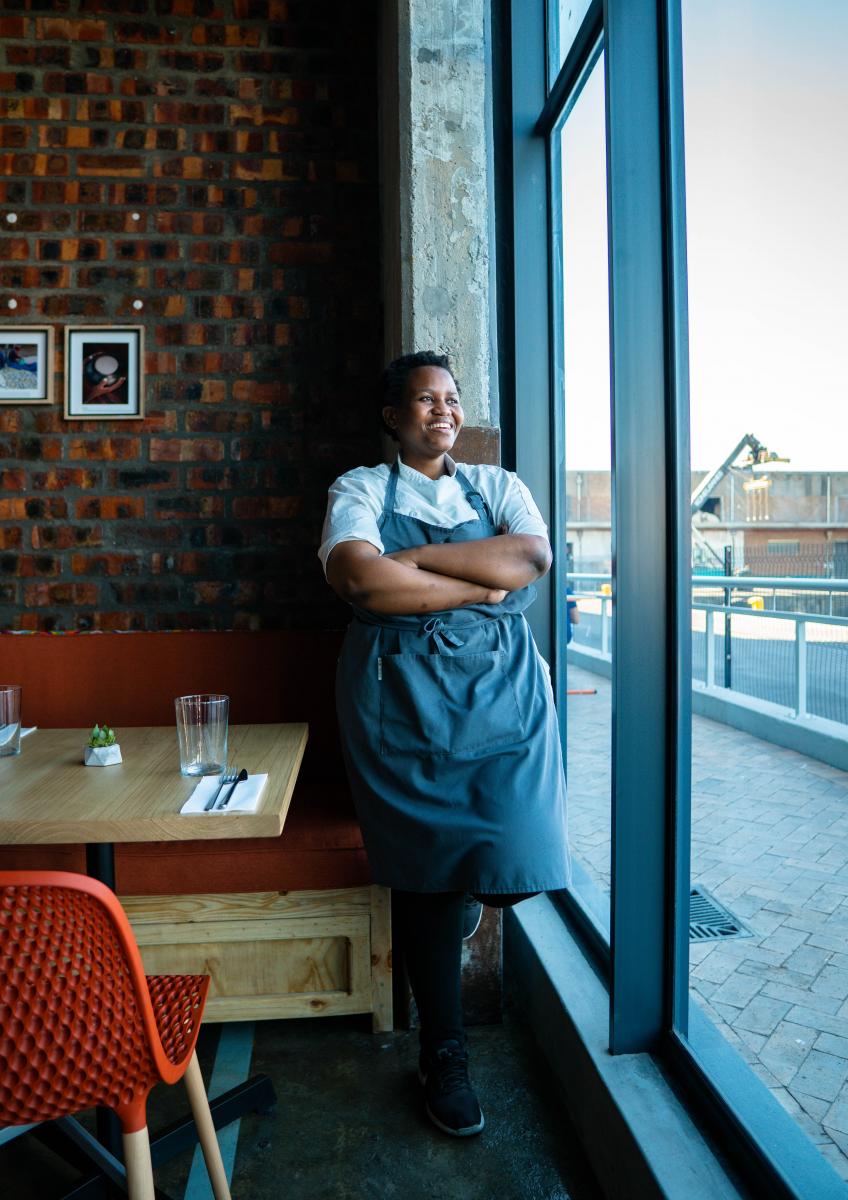 Molefe (27) established her modern Zulu restaurant in Cape Town at the V&A Waterfront’s Makers Landing space in 2020, after she lost her job in the restaurant industry due to the COVID19 pandemic.
Molefe (27) established her modern Zulu restaurant in Cape Town at the V&A Waterfront’s Makers Landing space in 2020, after she lost her job in the restaurant industry due to the COVID19 pandemic.
She says her cuisine was inspired by her upbringing in KwaZulu-Natal where her grandmother used to cook traditional food. She believes that this worked in her favour and helped her stand out from the rest in the 50 Next competition.
Molefe says Emazulwini, loosely translated as ‘the heavens’, has attracted interest from South Africans and international visitors keen to try her Zulu-inspired food. Makers Landing, which is a hub for South African food and culture, is the perfect venue for her, she says.
Emazulwini offers a seven-course set menu, which changes each season. Molefe’s food is beautifully served, and includes dishes such as Isijingi – pumpkin porridge, roasted pumpkin, peach gel and brown butter ice cream; Isibindi nechakalaka – butter basted ox liver, yellow lentil chakalaka and onion jus; and Iqanda, Isibindi noshatini – tartlet with roasted tomato relish, chicken liver and biltong-cured yolk crème.
“When you get to Cape Town, you may not get a true reflection of what South Africa is about, so I decided to stay true to myself with traditional food to show visitors what we eat. I tell myself every morning I am telling my story; my interpretation of what Zulu food is. I hope people embrace it for what it is. We hope to elevate ordinary dishes to the exceptional. Cape Town has a diverse population, apart from international tourists; they all get to learn about Zulu food,” she says.
The World's 50 Best’s 50 Next list
It was Molefe’s way of modernising traditional food that scored her a spot on the 50 Next list, which each year celebrates 50 people aged under 35 who are shaping the worldwide food scene. The competition enables these brilliant young chefs to show off their cooking to the world.
Molefe attended the awards ceremony in June in Bilbao, Spain, and says it was an inspirational day of discussions with other foodies.
“I have been fortunate to get people from across the country and all age groups to come enjoy our food. People are prejudiced against offal (the internal organs of an animal used as food) and I want to show them that if you treat it right, it can taste just as delicious as any other cut of meat. I also want to promote nose-to-tail dining, to champion this sustainable way of eating,” Molefe says.
Emazulwini also won the African Restaurant of the Year title at the fourth annual Luxe Restaurant Awards earlier this year.
Economic Reconstruction and Recovery Plan
Emazulwini employs four people and Molefe has plans to grow her business. She says South Africa’s rich heritage is a tourist drawcard.
As part of the Economic Reconstruction and Recovery Plan, the government has identified the tourism sector as one of the critical intervention areas and a key driver of economic recovery.
The Department of Tourism, the private sector and other stakeholders collaborated to develop the Tourism Sector Recovery Plan, which will help form strategic partnerships between government and industry to ensure improved visitor experiences. This will be done by introducing e-visas, promoting tourist safety and making it easier for tour operators to get licences.
For more information about Emazulwini restaurant call 062 160 2347
Did you know?
Emerging businesses in the tourism sector can apply for funding from the Department of Tourism, which will also show them how to market themselves and give them other support.
For more information, visit www.tourism.gov.za/Pages/home.aspx